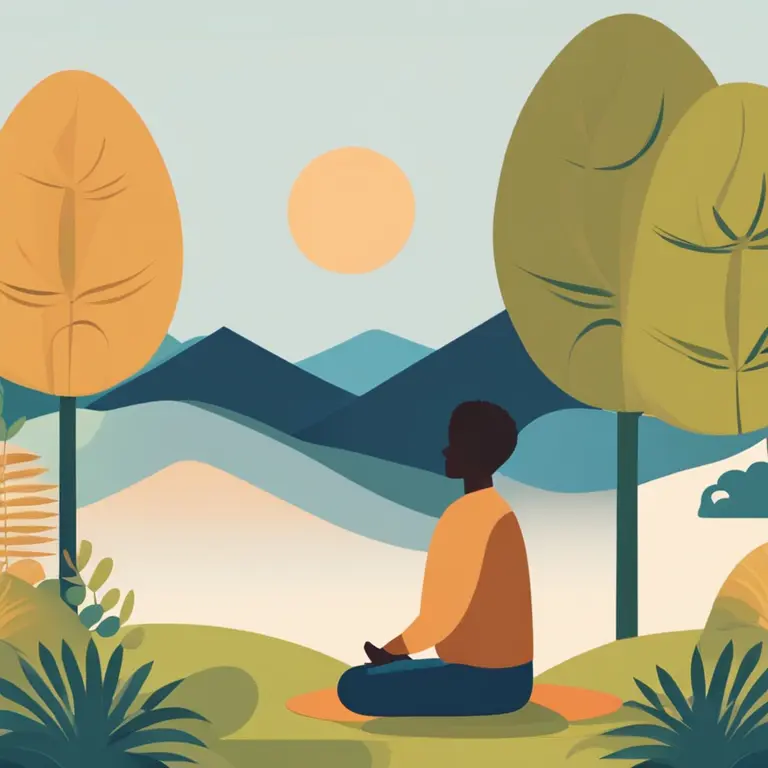
Easing Anxieties Through Meditation
Meditative practices can be effective tools for reducing stress and managing anxiety. Learn how they help and ways to incorporate them into your life.
article by Hina Kurosawa
The Rising Tide of Anxiety
In today's fast-paced world, stress and anxiety are common experiences. The constant barrage of information, the pressure of social media, and the hustle of everyday life often leave individuals feeling overwhelmed. Anxiety, a condition characterized by feelings of worry, nervousness, and unease, has shown a marked increase in prevalence, leading to a surge in the search for alternative methods of relief. In this context, many are turning towards age-old practices such as meditation to find solace and regain balance. This article delves into how these practices can serve as a refuge for those battling anxiety, offering relief in a holistic and healthy way.

Meditation and Its Impact on the Mind
Meditation has been an integral part of various cultures for thousands of years, but only recently has it gained ground in the realm of scientific research. Modern studies suggest that meditation can lead to changes in the brain, such as a decrease in beta waves, which are linked to active, cognitive processes. This shift implies a state of relaxation and focus. When practiced consistently, meditation fosters a state of mindfulness, allowing practitioners to stay present and engaged with their current experience. By doing so, it builds a sense of detachment from the incessant stream of thoughts, many of which are anxiety-inducing ruminations about past or future events.

Varieties of Meditation for Anxiety
Meditation comes in many forms, each with unique features and benefits. Mindfulness-based meditation encourages observers to acknowledge thoughts without judgment, returning focus to a point of reference, like breathing. In contrast, Transcendental Meditation involves silently repeating a mantra to help ease the mind into a deeply relaxed state. Another form, guided visualization, leads one through a peaceful scene to introduce calmness. While differing in approach, all these methods promote a non-reactive state of mind that's particularly beneficial for managing anxiety.

Getting Started with Meditation for Anxiety
Embarking on the journey of meditation can be as simple as dedicating a few minutes each day to the practice. The key is consistency. Beginners may find guided meditation apps or local classes helpful in introducing structure to their practice. It's also important to create a dedicated space for meditation, free from distractions and conducive to relaxation. By starting with short sessions and gradually increasing duration, the benefits of meditation will compound and become more apparent, leading to reduced anxiety over time.
Scientific Understanding of Meditation's Benefits
Research has shown that meditation can positively impact the brain and body. Studies using MRI scans have observed increased gray matter in areas related to emotion regulation and self-awareness in individuals who meditate regularly. Moreover, meditation has been linked to reduced levels of the stress hormone cortisol. These neurophysiological changes are pivotal—their impact extending beyond temporary relief, potentially offering lasting transformation in how one experiences and responds to stressful situations.
Integrating Meditation into Daily Life
For meditation's benefits to take root, it must become less of an activity and more of a lifestyle. Integrating mindfulness techniques throughout the day increases resilience against anxiety. Simple practices can be woven into daily routines, such as mindful breathing during a commute or mindful eating during meals. These moments build a foundation that allows individuals to remain centered during stressful situations, thereby preventing anxiety from escalating.
Conclusion: Meditation's Role in Managing Anxiety
Meditation is not a cure-all or a replacement for professional medical advice, but it's a powerful tool for cultivating inner peace and resilience against anxiety. It equips individuals with the ability to observe their thoughts without becoming entangled in them. As scientific research evolves, the understanding of meditation and its role in mental health continues to deepen, validating its place as a preventative and therapeutic practice for anxiety in our modern era.
Published: 1/15/2024
Modified: 1/15/2024
More predictions
Come back here soon to learn more about yourself and your future


Healing Through Mindfulness: Meditation & Trauma Recovery
Mindfulness meditation offers a powerful tool for individuals seeking solace and healing from traumatic experiences. Discover how this practice can aid in the journey towards inner peace.


Easing Loneliness with Meditation
Discover how mindfulness meditation can provide solace and connection to mitigate feelings of loneliness, enhancing emotional and mental well-being.


Discovering Life with Meditation Mantras
Delve into the transformative power of meditation mantras to harmonize your mind, body, and spirit for a tranquil existence.